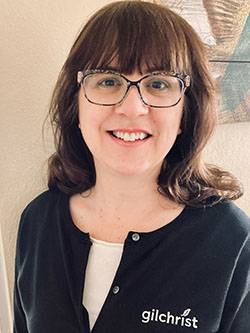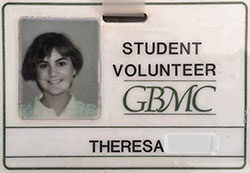Social Work Month: Spotlight on Hospice Social Workers
March is National Social Work Month, a time to celebrate the essential work of social workers. Gilchrist couldn’t do our work without our compassionate and talented social workers. They are the backbone of our care and are involved in every one of our services: hospice, elder medical care, palliative care, bereavement, and community development and healing.
Gilchrist’s social workers play an essential role in fulfilling our mission each day. They provide support, counseling, and many forms of assistance to our patients and their families. The passion and commitment our social workers demonstrate each day is inspiring. While we honor their commitment in the month of March, we are thankful every day for them.
An Inside Look at Social Work from Theresa Proctor, Social Worker on Gilchrist’s Nights, Evenings and Weekends Team (NEWS Team)

My roots with Gilchrist and GBMC run deep: my mother was a nurse and charter employee at GBMC. I was born there and as a teen, I spent a summer as a student volunteer, delivering flower arrangements to the patients. Years later, the Gilchrist hospice program inspired me to go back to school to become a social worker.
In 2001, my stepmother, Kathy, was diagnosed with Stage IV ovarian cancer. Within five months, she was referred to Gilchrist for hospice care. No further aggressive treatment was available for her.
Her first night at Gilchrist Center Towson, our whole family gathered in her room as the social worker asked questions to get to know us. I now know this is what is called the “initial assessment.” I was impressed by how the social worker got us talking about very hard things while also inspiring laughter and camaraderie. The care and support continued until Kathy’s death on January 6, 2002.
A seed had been planted. I researched hospice social work, and it became clear a master’s in social work was necessary. I graduated with my MSW in 2005. Within four months, I was offered a job with Gilchrist and have been here ever since. For 10 years, I worked on home care teams, initially full time, then part time after having kids. When Gilchrist created the weekend option, I realized I could achieve a better balance of work and family, so I jumped at it.

Weekend social workers do two 12-hr shifts, Saturday and Sunday. We respond to crises and urgent needs, sometimes with patients, other times with their family members. It’s a mixed bag, and no two weekend days are ever the same. We go into homes, facilities, the inpatient units and even hospitals. We assist with signing people up for hospice, and we might be there when a patient dies. We are often the first social worker someone has ever talked to, and it’s our job to help them feel comfortable opening up about difficult feelings.
At the heart of it, hospice social workers believe that talking helps. If a person’s first experience with social work leaves them feeling heard and validated, or if we highlight a strength in them they didn’t recognize in themselves, we make this difficult road a bit smoother for them. At the end of the weekend, we do a hand-off to the team that will follow the patient during the week. Our contact is typically brief but very impactful.
More than 15 years later, being a hospice social worker continues to be my dream job, and I am so thankful that Gilchrist changed the course of my life.


